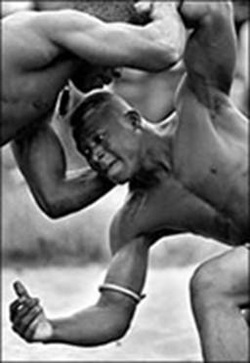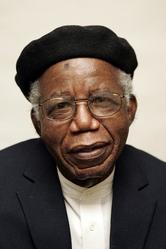
The next section in Things Fall Apart begins with the description of the Feast of the New Yam, which was when the village gave thanks to their gods. During the feast, the villagers get rid of all of their old yams and harvest and dine on the new yams. The quote "The new year must begin with tasty, fresh yams and not the shriveted and fibrous crop of the previous year" reminds me of the saying "In with the new, and out with the old". The New Yam Festival was a time when everyone was happy and families came together to celebrate. In the quote "The New Yam Festival was thus an occasion for joy throughout Umuofia", symbolism takes place. Yams and other foods mentioned in this story bring happiness to the people of the village of Umuofia. When there was a drought, the food supply decreased, and everyone's mood changed drastically.
The book also talks about Ekwefi, Okonkwo's second wife, and their daughter, Ezinma. Ezinma is described as a young girl with wisdom beyond her years. The two of them are cooking a meal. While preparing the meal, Ekwefi picks up a pot of boiling water and pours it out without feeling any pain. This prompts her daughter to ask "Is it true that when people are grown up, fire does not burn them?". This question could symbolize the way that okonkwo does not let obstacles over come him and the way that he does not show weakness. Okonkwo doesn't let 'fire' 'burn' him. The mother and daughter are preparing a meal for the wrestling match tonight, which competitors from many different neighboring villages compete. This match is one way for men to earn honor and respect. "Behind them was the big and ancient silk-cotton tree which was sacred" shows symbolism because the tree's legend is that it holds the good spirits of unborn babies, which can be symbolized by innocence because silk is a clean and flawless fabric. Whether the competing wrestlers one or lost, they were looked upon as leaders and protectors in every village.
Over the next three years, Okonkwo has noticed a lot of change in his son Nwoye. Ever since Ikemefuna has come to stay with them Nwoye has grown out of childhood and more into manhood. This is proven by the quote "Nwoye knew that it was right to be masculine and violent, but somehow he still preferred the stories that his mother used to tell...". One day, while painting the outside of the obi (hut), there came a loud buzzing noise descending upon the village. Everyone stopped and looked up, to find that the locusts were returning to the village. The locusts that came were collected that night and cooked. This section in the book gives the reader the idea that food brings people together and brings happiness.
The book also talks about Ekwefi, Okonkwo's second wife, and their daughter, Ezinma. Ezinma is described as a young girl with wisdom beyond her years. The two of them are cooking a meal. While preparing the meal, Ekwefi picks up a pot of boiling water and pours it out without feeling any pain. This prompts her daughter to ask "Is it true that when people are grown up, fire does not burn them?". This question could symbolize the way that okonkwo does not let obstacles over come him and the way that he does not show weakness. Okonkwo doesn't let 'fire' 'burn' him. The mother and daughter are preparing a meal for the wrestling match tonight, which competitors from many different neighboring villages compete. This match is one way for men to earn honor and respect. "Behind them was the big and ancient silk-cotton tree which was sacred" shows symbolism because the tree's legend is that it holds the good spirits of unborn babies, which can be symbolized by innocence because silk is a clean and flawless fabric. Whether the competing wrestlers one or lost, they were looked upon as leaders and protectors in every village.
Over the next three years, Okonkwo has noticed a lot of change in his son Nwoye. Ever since Ikemefuna has come to stay with them Nwoye has grown out of childhood and more into manhood. This is proven by the quote "Nwoye knew that it was right to be masculine and violent, but somehow he still preferred the stories that his mother used to tell...". One day, while painting the outside of the obi (hut), there came a loud buzzing noise descending upon the village. Everyone stopped and looked up, to find that the locusts were returning to the village. The locusts that came were collected that night and cooked. This section in the book gives the reader the idea that food brings people together and brings happiness.

 RSS Feed
RSS Feed